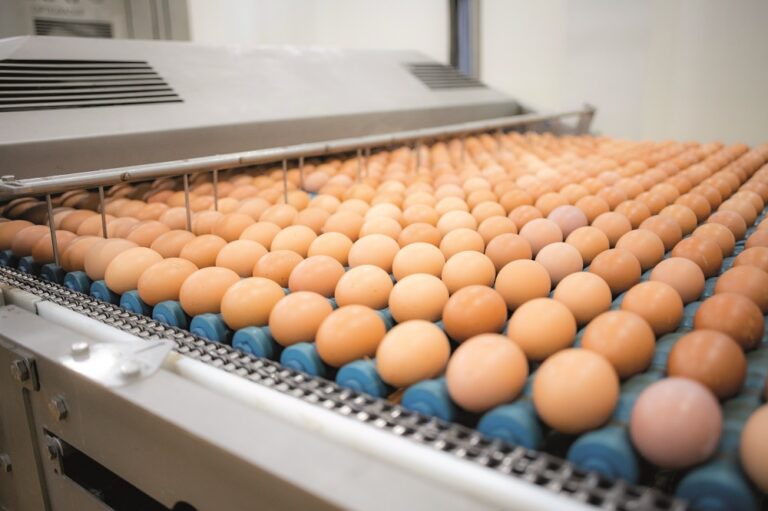A recent British Egg Industry Council webinar put out the message that buyers should resist buying imported eggs. Michael Barker reports
The tight supply of UK eggs is leading to greater volumes of imports, and consequently an increased safety risk to consumers.
That was the key message from environmental health practitioner (EHP) Sterling Crew, speaking on behalf of the British Egg Industry Council at a webinar organised by the industry body in partnership with the Chartered Institute of Environmental Health last month. Crew outlined the food safety dangers associated with imported eggs and advocated that buyers focus on British, Lion-assured eggs.
Crew kicked off his presentation by detailing the current precarious position in UK egg supply. The UK flock size has declined from 43m to 38m, he noted, and while chick placings are increasing, the overall flock is not expected to return to capacity for some time. Against that backdrop, producers are grappling with supply chain pressures, the impact of avian flu, and the transition from enriched colony cage to barn to meet retailers’ ‘cage-free’ commitment by 2025.
That’s created a situation whereby buyers – and major foodservice wholesalers in particular – are stocking more imported eggs, having previously stocked 100% British Lion product.
The danger, Crew argued, is that imports are increasing at a time of a series of salmonella and food safety issues across Europe linked to eggs. Poland, Denmark, Sweden, Belgium, France, Spain, Italy, Turkey and Ukraine have all been affected.
Crew pointed out that a joint FSA and FSS report highlighted “significant” food quality risks from the import of certain food products from Europe, including eggs, and argued there need to be greater controls to protect consumers. “Imported eggs can present a greater risk unless they have something that is equivalent to the British Lion Mark safety system,” he stated. “The imported food system isn’t as robust as it needs to be – we need more effort there, more investment, more new ways of working. Couple that with the fact we are looking at eggs and other foods that are coming into this country and not being inspected.”
Going into further detail, Crew highlighted some of the contaminated egg scares from across Europe, such as an incidence of salmonella in pasteurised liquid whole egg in Andalusia. British supermarkets also had to pull imported eggs off shelves after another contaminated egg scare. “This isn’t something new,” he added. “We don’t have the right import controls on high-protein foods and others. We don’t have a robust port health system with trained people like EHPs [acting] almost as our gatekeeper. I think we could have a potential risk. That’s why I’m a great advocate of buying British, because of welfare, safety and quality standards, and also sustainability.”
Food fraud is another major area of concern, with Crew claiming that three out of four big food safety incidents are fraud, ranging from situations such as the melamine in baby formula scandal, to horsegate, to cases of undeclared allergens. There is always increased risk of potential food fraud during periods of shortages, such as those seen in eggs in the last year, Crew warned. “There’s a lot of food fraud going on in the egg sector globally, especially when there are shortages, so if the UK has an egg shortage prices go up and you can imagine that’s what lures food fraudsters into the area,” he said. “In fact we had that six months ago – there was a farm in Ireland caught having cheaper eggs. They were cheaper because they [didn’t] meet the standard. This farmer had got himself a printing set and was printing the British Lion mark on the eggs and passing them off as Lion mark.”
Crew believes buyers must look out for the Lion mark and buy British to protect consumers. Detailing the history of the launch of the Lion code of practice, Crew pointed out the many benefits of the scheme for UK assurance and its role in hugely reducing salmonella cases linked to eggs in this country. Those benefits include the guaranteed production of British eggs, with flocks vaccinated against salmonella, independent auditing, on-shell information, feed controls and increased hygiene controls and salmonella testing on farm, among other elements.
Version 8 of the Lion code has just been released, and Crew urged environmental health practitioners to read it and note the updated details. The live document can be viewed online and includes a number of rigorous additions, such as beefed-up testing, auditing, enforcement and enhancements across the supply chain on salmonella control. These include expanded rodent control, on-farm and packing centre protocols, among other things. While salmonella is at its heart, the updated code also sees animal welfare standards brought more to the fore.
In July, the FSA concluded that the total number of outbreaks and cases of salmonella linked to consumption of eggs and egg products per year had not changed significantly since the 2016 ACMSF (Advisory Committee on the Microbial Safety of Food) risk assessment. Overall, analysis of salmonella in UK-produced hen shell eggs did not indicate a need for a risk assessment at this time, it added.
One further area of concern for buyers to note is that duck eggs are not covered by the Lion code. Advising consumers to cook them thoroughly, Crew noted that a lot of duck eggs are sold from the back of farm gates.
Summing up the theme of the webinar, Crew doubled down on his core message. “It’s time to crack down on imported eggs,” he said. “Unless we can get a system that we can trust from some countries, unless we can beef up our imported foods and our port health, which we so desperately must do, the safest system I believe is one we have direct control over as an industry, and direct control over as regulators. And consumers, if given the choice, always say they’d rather buy British eggs if they can because they now believe it’s a lot safer.”


